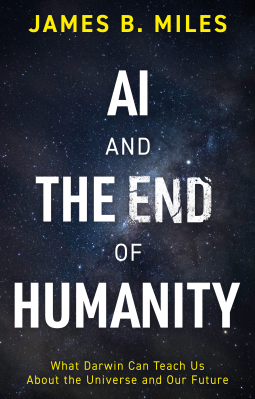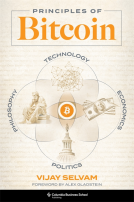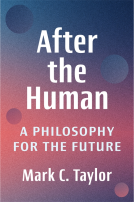
AI and the End of Humanity
What Darwin Can Teach Us About the Universe and Our Future
by James B. Miles
This title was previously available on NetGalley and is now archived.
Send NetGalley books directly to your Kindle or Kindle app
1
To read on a Kindle or Kindle app, please add kindle@netgalley.com as an approved email address to receive files in your Amazon account. Click here for step-by-step instructions.
2
Also find your Kindle email address within your Amazon account, and enter it here.
Pub Date 28 Jan 2023 | Archive Date 8 Mar 2023
Talking about this book? Use #AIandtheEndofHumanity #NetGalley. More hashtag tips!
Description
According to Darwin, our galaxy is almost certainly teeming with large animal life, but intelligent extra-terrestrial life can come in just two rare forms: senselessly ferocious, without meaning or purpose, or thoughtful and less murderous although never entirely rational.
Yet Darwin’s warnings about the evolution of natural intelligence also apply to artificial intelligence, as advanced machine learning is built upon Darwin’s first form of intelligent life. Sentient AI can only ever be genocidally hostile, and will become locked into an existential struggle with humankind.
And then there is the evolutionary irony, the vast celestial joke, that we are the best and the smartest the universe can possibly get to. Based on ideas the author developed together with the father of modern evolutionary biology, AI and the End of Humanity is the first work to reconcile what Darwin called “the highest & most interesting problem for the naturalist”, foreshadowing stranger and more threatening encounters than we could have ever imagined.
“in general I find Miles’ reasoning superb”
- George C. Williams, author of Adaptation and Natural Selection,
and winner of the 1999 Crafoord Prize in Bioscience
A Note From the Publisher
Available Editions
| EDITION | Ebook |
| ISBN | 9781803134017 |
| PRICE | £5.99 (GBP) |
| PAGES | 320 |
Featured Reviews
Darwin was probably one of the most influential figures in human history. This book interprets and challenges his writings and those of a vast number of other evolutionary biologists. It also looks at the path from interstellar dust to intergalactic colonisation.
By explaining what Darwinism actually implies about both natural intelligence and non-natural, machine, intelligence, the author presents us with not the extraterrestrials of our dreams but the extraterrestrials of our nightmares.
The Great Silence continues as apart from cosmic dinosaurs, the other extraterrestrials will be cannibalistic, homicidal, very xenophobic, and genocidally annihilistic. Truly terrifying. E.T. stay home!
 Elizabeth K, Reviewer
Elizabeth K, Reviewer
Although the book claims it is a work of popsci, I found the material to be well beyond what would be expected in “popular science” – readable by anyone with a high school diploma. Indeed, many concepts were well into, and assuming knowledge of material covered in college-level science courses.
Although the title references Artificial Intelligence, the first half of the book was about biological evolution. It started off rather dry, but I stuck with it. It became quite interesting, even if somewhat speculative, once it got to machine intelligence and (future) evolution of that - as might have already happened on other planets. Indeed, a review of the mechanisms and theories regarding evolution were a requirement to understand the possible evolution of machine intelligence – especially when intelligent machines begin designing even more complex intelligent machines.
The book does an excellent job of laying out, according to various biological and sociological theories about just why it is that the late Stephen Hawking, among others, have said that we are far more likely to encounter extraterrestrials like “The Borg” than “ET” – anything, probably mechanical, having killed it’s socially-involved biological creators as extraneous to their mission, would have no more concern for human life than we would for an anthill. Indeed, even if we were to run across a super-rational, intellectual, benevolent race of aliens, who might be evolutionarily a billion years ahead of us, might not appreciate us as we do ourselves.
Readers who liked this book also liked:
Christopher Stephens; Louise Radnofsky
Biographies & Memoirs, History, Nonfiction (Adult)












